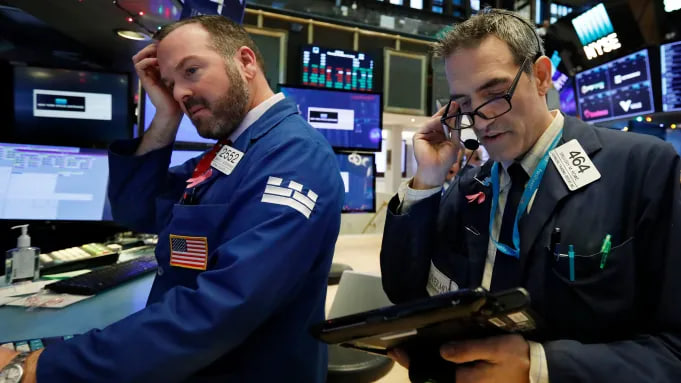Putin's Ruble Pivot: Navigating the Shifting Sands of Global Energy Finance (Meta description: Analysis of Putin's decree mandating Ruble payments for natural gas, impact on global energy markets, geopolitical ramifications, and future predictions.)
Imagine this: You're a global energy trader, nervously eyeing the fluctuating price of natural gas. Suddenly, a seismic shift: Russia, a heavyweight in the energy game, announces a major policy change. It's no longer business as usual. The Kremlin decrees that gas payments must be made in rubles. The implications ripple outwards, shaking the foundations of global finance and sending shockwaves through international relations. This isn't just about energy; it's about power, leverage, and a bold reshaping of the global order. This article dives deep into the intricacies of Putin's Ruble decree, examining its immediate and long-term impact, its strategic motivations, and the potential for unforeseen consequences. We'll explore the economic fallout, the geopolitical implications, and the innovative strategies businesses are adopting to navigate this turbulent new landscape. Get ready for a rollercoaster ride through the complex world of international finance and geopolitics—because the game has changed, and understanding the rules is more crucial than ever. From the perspective of a seasoned expert, we'll unravel the mystery behind Putin's move, providing you with actionable insights and a clear picture of the future of global energy markets. Buckle up!
Natural Gas and Ruble Payments: A Deep Dive into Putin's Decree
Putin's decision to mandate Ruble payments for natural gas exports wasn't a spur-of-the-moment decision; it was a calculated move with far-reaching geopolitical and economic implications. This seemingly simple decree represents a significant shift in the global energy landscape, challenging the established norms of international trade and currency exchange. Let's break down the core elements:
The decree, signed in 2022 (and extended to April 2025), essentially forces buyers of Russian natural gas to open accounts in Russian banks, converting their payments into rubles before the transaction is completed. This isn't simply about currency preference; it's a strategic play to bolster the Ruble, bypass Western sanctions, and demonstrate Russia's economic resilience.
Why did Putin do it? Several key factors are at play:
-
Sanctions Circumvention: Western sanctions imposed on Russia following the Ukraine invasion aimed to cripple its economy. Mandating Ruble payments is a direct countermeasure, attempting to maintain crucial revenue streams despite these sanctions.
-
Ruble Stabilization: The sanctions triggered a significant devaluation of the Ruble. By requiring Ruble payments for gas, demand for the currency is artificially increased, helping to stabilize its value and mitigate the impact of sanctions.
-
Geopolitical Leverage: This move represents a power play, demonstrating Russia's ability to influence global energy markets and exert pressure on its adversaries. It's a reminder of Russia's crucial role as a major energy supplier.
The Impact:
The immediate impact was a mix of market volatility and political maneuvering. Some countries complied, others resisted, resulting in a complex tapestry of reactions. The long-term effects are still unfolding, but several key areas are being significantly impacted:
-
Energy Markets: The shift to Ruble payments introduced significant uncertainty into global gas markets, leading to price fluctuations and supply chain disruptions.
-
Geopolitical Relations: The decree strained relations between Russia and the West, highlighting the ongoing geopolitical tensions and the weaponization of energy resources.
-
International Finance: The move challenged established norms of international finance and currency exchange, sparking debates about the future of global payment systems.
Navigating the New Reality:
Businesses involved in the energy sector face a new set of challenges. Compliance with the decree requires careful planning and a deep understanding of Russian banking regulations. Risk management has become even more critical, given the geopolitical volatility. Many companies are adopting innovative strategies, including hedging strategies and diversification of supply sources, to mitigate potential risks.
Case Studies: How Different Countries Responded
| Country | Initial Response | Current Strategy | Challenges Faced |
|-----------------|----------------------------------------------------|------------------------------------------------------|----------------------------------------------------|
| European Union | Largely resisted, seeking alternative energy sources | Diversifying gas supplies, investing in renewables | High energy prices, potential supply shortages |
| Germany | Initially hesitant, now diversifying energy sources | Focusing on renewable energy, exploring LNG imports | Dependence on Russian gas in the past, high costs |
| Turkey | Relatively compliant, maintaining strong ties with Russia | Maintaining a balanced approach, seeking to mitigate risks | Navigating complex geopolitical dynamics |
| China | Largely compliant, benefiting from discounted gas prices | Expanding energy cooperation with Russia | Potential for increased dependence on Russian gas |
Understanding the Russian Banking System
The effectiveness of Putin's decree hinges heavily upon the functionality and reliability of the Russian banking system. While sanctions have undoubtedly impacted the system, it remains operational, albeit with limitations. Understanding the intricacies of the Russian banking system is crucial for businesses participating in gas transactions. This includes knowledge of specific banks involved, compliance procedures, and the potential risks involved in conducting transactions within the system. Independent financial analysts and reports from reputable international organizations provide valuable insights into this complex landscape. It's crucial to consult these sources to gain a comprehensive understanding of the realities of conducting business within the Russian financial system.
The Future of Global Energy Finance
Predicting the future is, of course, a tricky business. However, several trends are likely to shape the future of global energy finance in the wake of Putin's Ruble decree:
-
Increased Energy Diversification: Countries will increasingly diversify their energy sources, reducing dependence on any single supplier, including Russia.
-
Accelerated Renewable Energy Transition: The global push towards renewable energy sources is likely to accelerate as countries seek energy independence.
-
Evolution of Payment Systems: The decree might trigger innovation in international payment systems, potentially leading to the development of alternative mechanisms to bypass traditional currency exchanges.
-
Geopolitical Restructuring: The decree will continue to shape geopolitical relationships, potentially leading to renewed alliances and shifts in global power dynamics.
Frequently Asked Questions (FAQs)
Q1: Will this decree last forever?
A1: The decree is currently extended to April 2025. Its continuation beyond that date will likely depend on several factors, including the geopolitical situation, the state of the Russian economy, and the global energy market.
Q2: How can businesses comply with the decree?
A2: Businesses need to establish accounts with designated Russian banks, convert their payments into rubles, and adhere to the specific procedures outlined by the Russian government. Seeking legal and financial advice is highly recommended.
Q3: What are the risks associated with non-compliance?
A3: Non-compliance could lead to disruptions in gas supplies, financial penalties, and reputational damage.
Q4: Is this a sign of a new world order?
A4: While it's too early to definitively declare a "new world order," the decree marks a significant shift in global energy markets and international finance, suggesting a potential move away from the existing dollar-centric system.
Q5: How will this impact the price of natural gas?
A5: The impact on gas prices will vary depending on several factors, including supply, demand, and geopolitical developments. However, the decree has introduced greater uncertainty and volatility into the market.
Q6: What alternatives exist for countries seeking to reduce reliance on Russian gas?
A6: Alternatives include diversifying gas suppliers, investing in domestic gas production, accelerating the transition to renewable energy sources, and exploring alternative energy technologies like nuclear power.
Conclusion:
Putin's Ruble decree is undeniably a game-changer. It's not just a financial maneuver; it's a bold geopolitical strategy with far-reaching implications. The short-term consequences are already being felt, from market volatility to strained international relations. The long-term impacts, however, remain uncertain. Navigating this new reality requires careful planning, adaptable strategies, and a deep understanding of the evolving geopolitical landscape. One thing is certain: the energy game has changed, and those who adapt and evolve will be best positioned for success.



